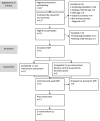Mindful Parenting Group Intervention for Parents of Children with Anxiety Disorders
- PMID: 36689038
- PMCID: PMC9869845
- DOI: 10.1007/s10578-023-01492-2
Mindful Parenting Group Intervention for Parents of Children with Anxiety Disorders
Abstract
Parenting behaviour and rearing style contribute to the intergenerational relationship between parental and child anxiety. Current psychological interventions for child anxiety typically do not adequately address parental mental health, parenting behaviours or the parent-child relationship. The current pilot study examines the effectiveness of a mindful parenting intervention (MPI) for parents of young children with clinical anxiety. It was hypothesised that the intervention would be associated with improvements in parental stress, mental health, and mindfulness, and a reduction in child clinical anxiety symptoms. Twenty-one parents of children aged 3-7 years diagnosed with anxiety disorders participated in an 8-week group MPI program that aimed to increase their intentional moment to moment awareness of the parent-child relationship. Parental (anxiety, depression, hostility, stress, burden, mindfulness, mindful parenting) and child (anxiety diagnoses, anxiety severity, comorbidities) outcomes were assessed at pre- and post-intervention, and at 3-month follow-up. Parents reported a significant increase in mindful parenting and a significant reduction in parent-child dysfunctional interaction, but no change in mental health symptoms. There was a significant reduction in parent-rated child anxiety symptoms, severity of child anxiety diagnosis and number of comorbid diagnoses at post and 3-month follow-up. Limitations include a lack of waitlist control, small sample size, and participants were largely mothers, from intact families and highly educated. There was attrition of 43% and outcomes were predominantly self-report. MPIs offer a novel and potentially effective method of increasing mindful parenting, decreasing dysfunctional parent-child interactions, reducing parenting stress and might also be an effective early intervention for indirectly decreasing young children's clinical anxiety symptoms. Larger-scale controlled trials of MPIs are needed.
Keywords: Anxiety disorders; Children; Intervention; Mindful parenting interventions; Mindfulness; Parenting.
© 2023. The Author(s).
Conflict of interest statement
The authors declare that they have no competing interest(s).
Figures
Similar articles
-
The effectiveness of mindful parenting programs in promoting parents' and children's wellbeing: a systematic review.JBI Database System Rev Implement Rep. 2016 Mar;14(3):139-80. doi: 10.11124/JBISRIR-2016-2314. JBI Database System Rev Implement Rep. 2016. PMID: 27532143
-
Mindful with your baby for mothers of infants with (parental) stress in a non-clinical setting: a wait-list controlled pilot trial.BMC Pregnancy Childbirth. 2022 Apr 7;22(1):298. doi: 10.1186/s12884-022-04640-z. BMC Pregnancy Childbirth. 2022. PMID: 35392847 Free PMC article.
-
Exploring the link between maternal attachment-related anxiety and avoidance and mindful parenting: The mediating role of self-compassion.Psychol Psychother. 2016 Dec;89(4):369-384. doi: 10.1111/papt.12082. Epub 2015 Oct 23. Psychol Psychother. 2016. PMID: 26493983
-
A randomised controlled trial (MindChamp) of a mindfulness-based intervention for children with ADHD and their parents.J Child Psychol Psychiatry. 2022 Feb;63(2):165-177. doi: 10.1111/jcpp.13430. Epub 2021 May 24. J Child Psychol Psychiatry. 2022. PMID: 34030214 Free PMC article. Clinical Trial.
-
[Mindful Parenting: Mindfulness in the Parent-Child Relationship].Z Kinder Jugendpsychiatr Psychother. 2022 Sep;50(5):395-406. doi: 10.1024/1422-4917/a000853. Epub 2022 Feb 21. Z Kinder Jugendpsychiatr Psychother. 2022. PMID: 35187975 Review. German.
Cited by
-
The Father's Part: A Pilot Evaluation of a Father-Centered Family Intervention Group in Child and Adolescent Psychiatry.Behav Sci (Basel). 2023 Dec 22;14(1):13. doi: 10.3390/bs14010013. Behav Sci (Basel). 2023. PMID: 38247664 Free PMC article.
-
The influential factors of anxiety among caregivers of children with CL/P: a path analysis based on diathesis-stress theoretical model.BMC Public Health. 2024 Nov 14;24(1):3172. doi: 10.1186/s12889-024-20603-9. BMC Public Health. 2024. PMID: 39543567 Free PMC article.
-
Psychological well-being and needs of parents and carers of children and young people with mental health difficulties: a quantitative systematic review with meta-analyses.BMJ Ment Health. 2024 Aug 4;27(1):e300971. doi: 10.1136/bmjment-2023-300971. BMJ Ment Health. 2024. PMID: 39103177 Free PMC article.
References
MeSH terms
LinkOut - more resources
Full Text Sources
Medical


